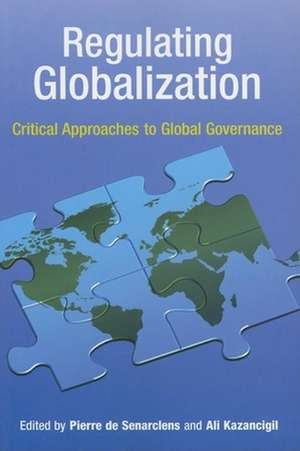Regulating Globalization: Critical Approaches to Global Governance
Editat de Pierre de Senarclens, Ali Kazancigilen Limba Engleză Paperback – 31 iul 2007
While globalization is thriving, its consequences remain contradictory and controversial. Although it is an effective process in generating economic growth, it can also lead to an excessive concentration of wealth and, in some sectors, increasing inequalities within and between countries. A major explanation for such imbalances lies in regulation deficiencies in economic, financial, commercial, and environmental fields, due to unaccountable, undemocratic, inequitable, and ineffective global governance. The authors of this book offer critical historical and forwardlooking analyses on current global governance. They formulate proposals for achieving a more accountable, transparent, participatory global governance system, together with an institutional architecture for regulating globalization that combines economic efficiency and social equity. Emphasis is put on multilevel governance, underlining the relevance of regional governance as a link between local and global levels. A central argument in the volume is that the legitimacy of global governance is weak, and the way to make it more legitimate is to enhance the participation of state and nonstate agents, give a strong role to statehood and democratic politics, and give priority to public interest over private and corporate interests in global governance.
Preț: 237.71 lei
Preț vechi: 315.23 lei
-25% Nou
Puncte Express: 357
Preț estimativ în valută:
45.49€ • 47.43$ • 37.81£
45.49€ • 47.43$ • 37.81£
Comandă specială
Livrare economică 28 februarie-14 martie
Doresc să fiu notificat când acest titlu va fi disponibil:
Se trimite...
Preluare comenzi: 021 569.72.76
Specificații
ISBN-13: 9789280811360
ISBN-10: 9280811363
Pagini: 338
Dimensiuni: 152 x 229 x 20 mm
Greutate: 0.49 kg
Editura: Brookings Institution Press
Colecția United Nations University Press
ISBN-10: 9280811363
Pagini: 338
Dimensiuni: 152 x 229 x 20 mm
Greutate: 0.49 kg
Editura: Brookings Institution Press
Colecția United Nations University Press
Notă biografică
Pierre De Senarclens is professor of international relations at the University of Lausanne, Switzerland, and vice president of the Swiss Red Cross. Ali Kazancigil is a political scientist and the secretary general of the International Social Science Council, Paris, and formerly UNESCO's assistant director general for social and human sciences.
Descriere
While globalization is thriving, its consequences remain contradictory and controversial. Although it is an effective process in generating economic growth, it can also lead to an excessive concentration of wealth and, in some sectors, increasing inequalities within and between countries. A major explanation for such imbalances lies in regulation deficiencies in economic, financial, commercial, and environmental fields, due to unaccountable, undemocratic, inequitable, and ineffective global governance. The authors of this book offer critical historical and forwardlooking analyses on current global governance. They formulate proposals for achieving a more accountable, transparent, participatory global governance system, together with an institutional architecture for regulating globalization that combines economic efficiency and social equity. Emphasis is put on multilevel governance, underlining the relevance of regional governance as a link between local and global levels. A central argument in the volume is that the legitimacy of global governance is weak, and the way to make it more legitimate is to enhance the participation of state and nonstate agents, give a strong role to statehood and democratic politics, and give priority to public interest over private and corporate interests in global governance.
